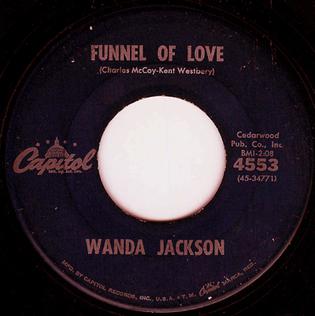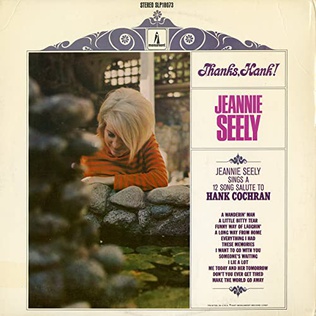Related Research Articles

Garland Perry "Hank" Cochran was an American country music singer and songwriter. Starting during the 1960s, Cochran was a prolific songwriter in the genre, including major hits by Patsy Cline, Ray Price, Eddy Arnold, and others. Cochran was also a recording artist between 1962 and 1980, scoring seven times on the Billboard country music charts, with his greatest solo success being the No. 20 "Sally Was a Good Old Girl." In 2014, he was inducted into the Country Music Hall of Fame.

The Versatile Burl Ives! is a 1961 album by Burl Ives, containing his hit single "A Little Bitty Tear." The album reached No. 35 on Billboard's 1962 Pop Album Chart. In the same year, "A Little Bitty Tear" climbed to No. 1 on Billboard's Adult Contemporary Chart, No. 2 on the Country Singles Chart, and No. 9 on the Pop Singles Chart. The pop, country, and folk songs on this album were selected to highlight the folk singer's versatility. Some of his performances, such as his cover of Johnny Cash's "I Walk the Line," represent a significant departure from his earlier repertoire. Ives is accompanied by the Anita Kerr Singers and Owen Bradley's orchestra.

Songs of the West is one of the several albums from the early 1960s that signalled Burl Ives's move away from folk music into country western and pop. In Ives's discography this album is immediately preceded by The Versatile Burl Ives! and followed by It's Just My Funny Way of Laughin', two Decca albums containing songs that earned Ives his highest rankings on Billboard's pop, country, and easy-listening charts.
"Funny Way of Laughin'" is a song written by Hank Cochran and performed by Burl Ives. It reached #3 on the U.S. adult contemporary chart, #9 on the U.S. country chart, #10 on the U.S. pop chart, and #29 on the UK Singles Chart in 1962. It was featured on his 1962 album It's Just My Funny Way of Laughin'.

"Funnel of Love" is a song by Wanda Jackson written by Charlie McCoy and Kent Westbury. Recorded in 1960 and released in 1961, "Funnel of Love" was released as the B-side to Jackson's major country-pop single, "Right or Wrong". Although the song never became a hit independently from the A-side, it has received notable critical acclaim and attention. The song's unique combination of country, rock, and blues have made it a favorite of fans and critics. Many also consider "Funnel of Love" to be one of Jackson's best vocal performances.
"Little Green Apples" is a song written by Bobby Russell that became a hit for three different artists, with their three separate releases, in 1968. Originally written for and released by American recording artist Roger Miller, "Little Green Apples" was also released as a single by American recording artists Patti Page and O. C. Smith that same year. Smith's version became a #2 hit on both the Billboard Hot 100 and Billboard Hot Rhythm & Blues Singles charts, while Miller's version became a Top 40 hit on the Hot 100 as well as the UK Singles Chart. Page's version became her last Hot 100 entry. The song earned Russell a Grammy Award for Song of the Year and for Best Country Song. In 2013, "Little Green Apples" was covered by English recording artist Robbie Williams featuring American recording artist Kelly Clarkson, which became a top 40 hit in Mexico.

The singles discography of Wanda Jackson, an American recording artist, consists of 81 singles, nine international singles, one other charted song, and three music videos. In 1954 at age 16, she signed as a country artist with Decca Records. Her debut single was a duet recording with Billy Gray which reached the eighth spot on the Billboard Hot Country Singles chart, also in 1954. Refusing to tour until completing high school, Jackson's further singles for Decca failed gaining success. She signed with Capitol Records in 1956 and began incorporating rock and roll into her musical style. Jackson's first Capitol single exemplified this format and became a national top-20 country hit. Follow-up rock singles between 1957 and 1959 failed gaining enough attention to become hits including, "Hot Dog! That Made Him Mad", "Fujiyama Mama", and "Honey Bop". In 1960 however, the rock and roll-themed, "Let's Have a Party", became Jackson's first Billboard top-40 pop hit after it was picked up by an Iowa disc jockey.
"You Can't Have My Love" is a song written by Billy Gray, Chuck Hardin, Marty Roberts, and Mark Thompson. It was recorded by American musician Wanda Jackson and American country musician Billy Gray.
"Right or Wrong" or "Right or Wrong " is a song written and originally recorded by Wanda Jackson, an American country, rock, and Christian music artist. Originally, the song was a major country and pop hit for Jackson in 1961. A second version was released in 1964 that became popular by American pop artist, Ronnie Dove.
"In the Middle of a Heartache"' is a song written by Laurie Christenson, Pat Franzese, and Wanda Jackson. The song was recorded by Wanda Jackson, an American country, rock, and Christian artist.
"The Box It Came In" is a song written by Vic McAlpin (1918-1980) that was recorded by American country, rock, and Christian artist, Wanda Jackson.
"Tears Will Be the Chaser for Your Wine" is a song written by Leroy Coates and Dale Davis. It was recorded and released as a single by American country, rock, and Christian artist, Wanda Jackson.
"A Woman Lives for Love" is a song written by George Richey, Glenn Sutton, and Norro Wilson. It was recorded and released as a single by American country, rock, and Christian artist, Wanda Jackson.
"Fancy Satin Pillows" is a song written by Jerry Crutchfield and Dee Moeller. It was recorded and released as a single by American country, rock, and Christian artist, Wanda Jackson.
"Two Separate Bar Stools" is a song written by Bill Graham. It was recorded and released as a single by American country, rock, and Christian artist, Wanda Jackson.
"Don't Let the Good Times Fool You" is a song written by Ronald Hellard and Gary S. Paxton. It was recorded and released as a single by American country artist Melba Montgomery in 1975.
"Why Can't He Be You"' is a song written by Hank Cochran that was originally recorded by American country artist Patsy Cline. The song became a minor chart hit was later included on Cline's Greatest Hits album. It has since been notably covered by Loretta Lynn and Norah Jones.

Thanks, Hank! is a studio album by American country artist Jeannie Seely. It was released on May 8, 1967, by Monument Records and was produced by Fred Foster. The record was Seely's second studio album issued and contained two singles, including the major hit "A Wanderin' Man". The album contained songs written entirely by Hank Cochran, a country songwriter, who was also Seely's husband at the time.

"If I Cried Every Time You Hurt Me" is a song written by Harlan Howard that was originally recorded by American Rockabilly and Country artist Wanda Jackson. It was released as a single in 1962 via Capitol Records and was issued on her album titled Wonderful Wanda. The song reached chart positions on the American country, pop and adult contemporary charts following its release.

Wonderful Wanda is a studio album by American recording artist Wanda Jackson. It was released in August 1962 via Capitol Records and contained 12 tracks. It was the fourth studio album in Jackson's music career and her first to consist entirely of country music songs. Wonderful Wanda included the songs "In the Middle of a Heartache", "A Little Bitty Tear" and "If I Cried Every Time You Hurt Me". All three recordings became commercially-successful singles on both the country and pop charts respectively.
References
- ↑ "Burl Ives discography, part two". Praguefrank's Country Discographies. Retrieved 18 December 2013.
- ↑ "Burl Ives discography, part one". Pragufrank's Country Discographies. Retrieved 18 December 2013.
- 1 2 3 Hyatt, Wesley (1999). The Billboard Book of #1 Adult Contemporary Hits (Billboard Publications), page 6.
- ↑ Whitburn, Joel (2004). The Billboard Book of Top 40 Hits, 8th Edition (Billboard Publications), page 306.
- ↑ Burl Ives Official Charts Company info OfficialCharts.com. Retrieved 31 May 2009.
- ↑ "CHUM Hit Parade - January 8, 1962".
- ↑ Flavour of New Zealand, 15 March 1962
- ↑ "Wanda Jackson discography, two". Praguefrank's Country Discographies. Retrieved 19 December 2013.
- 1 2 "Wanda Jackson discography, part one". Praguefrank's Country Discographies. Retrieved 19 December 2013.
- ↑ "Wanda Jackson chart positions". Allmusic . Retrieved 19 December 2013.
- ↑ David Kent (1993). Australian Charts Book 1970—1992. Australian Chart Book Pty Ltd, Turramurra, N.S.W. ISBN 978-0-646-11917-5.
- ↑ "Wanda Jackson Chart History (Hot 100)". Billboard. Retrieved July 12, 2021.
- 1 2 3 "Hank Cochran discography". Praguefrank's Country Discographies. Retrieved 19 December 2013.
- ↑ "Hank Cochran chart positions". Allmusic . Retrieved 19 December 2013.